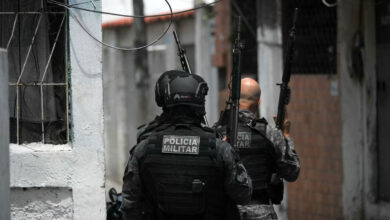A new conversation has been taking place around Egypt for the past five months, one that rarely came up before. How do you acquire a firearm?
With rising crime rates and an ongoing security vacuum since 28 January, the smuggling, manufacturing, and purchasing of weapons is on the rise.The insecurity has generated new clients and markets in a country where previously one rarely heard of civilians carrying personal weapons. The persistent security vacuum has sparked a virtual arms race in many parts of the country.
Purchasing personal firearms is legal in Egypt, but there are rigid licensing laws. Before the 25 January revolution, it was generally believed that gun licensing laws were another way to cater to the privileged few, with NDP members reportedly going through less hassle in acquiring a firearm.
Alaa, who transports cargo in his pick-up truck between Old Cairo and 6 October, bought his gun in the days shortly after 28 January when rumors of imminent gang attacks were rampant. He is one of many Egyptians who bought a firearm for the first time during the uprising.
“During the revolution we heard of thieves running wild, so my friends and I all bought guns to protect ourselves. Maybe they never came because we had weapons,” Alaa said.
“In the beginning, we needed [guns] during the days of the neighborhood watch, but now it seems like everyone has one,” he said.
Although the security situation has calmed down somewhat since those days, many who purchased weapons for security reasons do not yet feel safe enough to give them up.
In an attempt to curb the spread of weapons, the ruling Supreme Council of the Armed Forces (SCAF) recently announced that any Egyptian who turns in an illegal firearm before 30 June will be able to do so without fear of prosecution.
But many maintain too profound a mistrust of police to turn in their weapons. “Before the revolution, the police would plant local weapons they seized as evidence against individuals,” said Abdou, a mechanic’s apprentice from Stabl Antar, an informal neighborhood in Old Cairo.
He claims that “handing in weapons” was a pre-revolutionary tradition, where police allowed people to walk free if they were able to provide them with weapons. They would, in turn, use the weapons against suspects they wanted to imprison.
The guns that are now ubiquitous around Egypt come from a variety of sources, but guns stolen directly from police stations concern police the most.
“The call to hand in the guns is actually directed at those who took them from the stations,” said Tarek Sirri, a major in Cairo’s General Security.
When angry protesters overwhelmed police forces on 28 January, police stations around the country were looted. Now, firearms taken from these stations are circulating freely on Egypt’s streets.
But many of the weapons have come from much further afield.
Ibrahim, a weapons dealer, says that he gets the majority of the weapons he sells from Sudan via Upper Egypt. (Ibrahim’s name and the names of all the weapons dealers mentioned in this story have been changed due to the illegal nature of their work.)
Bedouin tribes have free reign over desert paths in both Sudan and Chad, and tribal warfare brings in a surplus of weaponry and ammunition, much of which finds its way across the border into Egypt, according Ibrahim.
“Because of the Darfur and Chad situation, there are a lot of weapons south of the border, and smugglers are able to get their hands on them,” says the dealer, who goes to Assiut Governorate to collect shipments for sale in Cairo.
According to Ibrahim, the ongoing violence in Libya has also made it much easier for smuggled weapons to make their way to Cairo. “With the Libyan border open, a lot of weapons are coming in from there,” says Ibrahim.
On Egypt’s eastern border, gun-smuggling from Gaza has long been a chronic problem. Last Wednesday, North Sinai police and the Egyptian military reportedly captured a weapons and drug trading ring. They seized many automatic weapons in the process.
Smuggled AK-47s go for LE15,000 to LE20,000. The high price puts them beyond the reach of most Egyptians.
“These types of weapons are only bought by people who are either really rich or want to do harm,” said Hassan, a gun dealer in the Manial neighborhood.
With the big guns out of reach, many Egyptians, particularly those in exceptionally poor communities where crime rates are often higher, tend to opt for cheaper weapons known as fards, hand-crafted handguns that shoot 16mm and 12mm shotgun cartridges. These are made locally by blacksmiths using scrap steel originating from discarded water pipes and vehicle spare parts.
Before the revolution, these improvised guns sold for LE300 to LE500. “These are regular blacksmiths, who are very skilled. They make the guns under the table for more money. A kilo of scrap metal worth LE3 can be made into these guns and sold for LE1000,” Ibrahim said.
The rise in demand for weapons during and immediately after the uprising caused prices to shoot up significantly. Despite increased supply, however, increased demand has kept prices high. During the zenith of the security vacuum, however, prices of the locally made fard shot up to LE1000, while decent sawed-off shotguns sold for LE2000.
“All of a sudden, everyone, especially in poorer neighborhoods, wanted one,” Hassan said.
Prices of AK-47s even went up to LE30,000, but settled back to between LE17,000 and LE19,000. In the US, where these weapons are available for legal purchase, prices range from US$500 to US$800 (or about LE3000 to LE5000).
The market for illegal weapons seems to have stabilized once again. “I can find any type of weapon for anyone now. The channels for purchasing weapons are now known,” said Hassan.
All those interviewed who own illegal weapons said that they would not heed the SCAF’s call to hand them in. “It’s still every man for himself in our parts,” said Salah, a grocer in Stabl Antar. “If I hand in my weapon, I’m inviting people to rob me.”




